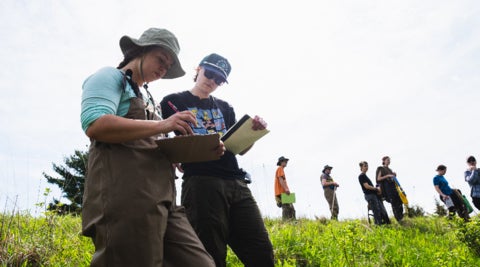Geography and Environmental Management

Join the movement, meet the moment.
Explore how people shape the planet we live on. Delve into the dynamics of the Earth’s physical systems. Help solve many of the world’s most pressing problems, such as climate change, water scarcity, resource management, global food security, natural resource sustainability, and more.
Ranked 5th in Canada for research and reputation (QS World University Rankings by Subject 2025), Waterloo's Geography and Environmental Management department is one of Canada's largest. Follow us on Instagram to learn about our 70+ geography courses, including lots of field studies, as well as gaining paid work experience through co-op.
Use the program's flexibility to focus your degree with specializations and options or even add another major. You’ll quickly connect with other students in the Faculty of Environment’s welcoming and close-knit community.
What courses will you take in Geography and Environmental Management?
First-year courses
During your first year, you'll take a combination of geography and environmental studies courses.
In your upper years, about half of the classes you'll take will be in geography.
This is a sample schedule. Courses or when a course is offered may change depending on availability.
After first year
About half of the classes you’ll take will be Geography courses. With your remaining classes, you can choose electives from many of the 100 subject areas at Waterloo.
View all the courses required for your degree.
Customize your Geography degree
You can add additional areas of expertise to your degree by including one or more of the areas of focus within the program.
- Aviation
- Climate Change and Environment
- Earth Systems Science
- Economy and Society
- Geomatics
You can also choose one of the minors available to all Waterloo students.
Faculty:
Faculty of Environment
Degree:
Bachelor of Environmental Studies in Geography and Environmental Management
Available as a co-op program?
Yes
Available as a regular program?
Yes
Available as a minor?
Yes
30+ possible minors. Include additional interests and skills by adding one of more than 30 minors to your degree. Or do a double major. Or add an option. So go ahead: customize your degree to your interests!
Study in Asia or the Canadian Arctic. Gain experience with environmental issues around the world through field studies in the Arctic or in countries such as South Africa or Singapore.
Co-op = relevant paid work experience
In the world's leading co-op program, you'll explore potential careers, learn to interview for jobs, graduate with up to two years of valuable experience — and make money!
Sample co-op job titles
- Aquatic research technician
- Forester/forest technician
- Agroclimate analyst
- GIS technician
- Assistant wildlife officer
- Environmental policy analyst
- Sustainability projects coordinator
Co-op work-study sequence
Starting in second year, you'll normally alternate between school and work every four months, integrating your classroom learning with real-world experience. You can return to the same employer for a couple of work terms to gain greater knowledge and responsibility or work for different employers to get a broad range of experience.
| Year | September to December (Fall) | January to April (Winter) | May to August (Spring) |
|---|---|---|---|
| First | Study | Study | Off |
| Second | Study | Co-op | Study |
| Third | Co-op | Study | Co-op |
| Fourth | Study | Co-op | Study |
| Fifth | Co-op | Study | - |
Your first work term will be halfway through second year (January to April 2028).
What can you do with a geography degree?

There is a location component to much of the vast amounts of data collected by organizations today, providing opportunities for geography graduates to advise businesses on location strategies, governments on natural area protection, and more.
You can learn more in our article on careers in geography, but graduates often work in conservancy, education, government, business, non-profits, and consulting.
- Conservation Technician — Nature Conservancy of Canada
- Planner, Parks Recreation — Monteith Brown Planning Consultant
- Geographic Information System Technician — Algonquin Power Utilities
- Aquatic Specialist — Wood Environment Infrastructure Solutions
- Research Associate — Environics Analytics Group
- Junior Environmental Scientist — BluMetric Environmental
- Environmental Planner — Ontario Ministry of Transportation Ontario
Graduates also pursue a wide range of further education, including specialized master's and PhD programs as well as education (teaching), urban planning, GIS and spatial data analysis, environmental management, human geography, and more.
Admission requirements
Ontario students: six Grade 12 U and/or M courses including
- Any Grade 12 U English (minimum final grade of 70% is required)
Admission average: High 70s
Not studying in Ontario? Search our admission requirements.
How to apply
Apply directly to this program on your application.
Success starts at Waterloo
As home to Canada's largest faculty of environment and the world's leading co-op program, Waterloo is the only place where you can test drive up to five careers before you graduate.



*University of Waterloo Key Performance Indicators 2024
**for social science programs, which include programs within the Faculty of Environment
Get information about programs, applying, and more!
Subscribe to our monthly newsletter
Get valuable updates and tips sent straight to your inbox!
Contact us

Questions about courses, programs, requirements, or careers?
Please contact Megan Muir, our Faculty of Environment recruitment co-ordinator who can answer any questions you have.
From the Missing Manual
It’s not every day that you come face to face with polar bears. Or hike untouched moraines. Cassandra did! Read our article on...